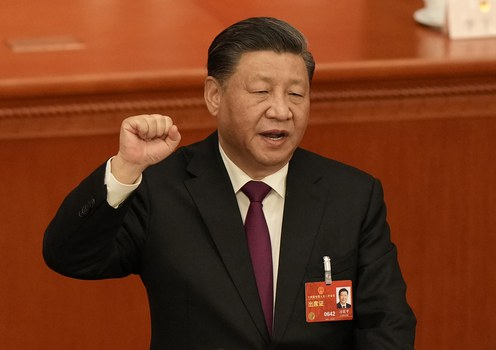China Rule Book Rewritten, Marxism, Leninism, Maoism Deleted

China has rewritten its political rulebook to delete references to all ideology but that of supreme party leader Xi Jinping, forcing its cabinet, the State Council, to defer to highest-ranking Communist Party leaders on all “major decisions.”
The changes come amid a far-reaching institutional shake-up as Xi Jinping begins a third and indefinite term in office, concentrating executive power in the hands of Communist Party working groups rather than in the hands of ministers and other administrative officials.
References to Marxism, Leninism, Mao Zedong Thought, the thought of Deng Xiaoping and the ideologies of former presidents Jiang Zemin and Hu Jintao have all been deleted from the new edition of the document titled “Working Procedures for the State Council” that was published on official websites on March 18.
State Council officials under the leadership of incoming premier Li Qiang are referred solely to the political thought of Xi Jinping, a rulebook that has been edited down from 64 articles to just 43.
While the order to follow the lead of the ruling Communist Party Central Committee with Xi Jinping at the core remains unchanged, officials are also now required to “report any major decisions, major events and important situations” to the Central Committee “in a timely manner.”
Previous references to “administration according to law, seeking truth from facts, democracy, openness, pragmatism and integrity” have gone, as have the requirement for the State Council “to correct illegal or inappropriate administrative actions,” or to “guide and supervise” the bureaucracy.
Mao, Jiang and Hu
Australia-based current affairs commentator Zhang Guangzhong said many of the former powers of the State Council have been transferred to the Central Committee, and that this is reflected in a slimmed-down rulebook.
“This revision of the rules highlights the importance of allegiance to Xi Jinping and seeks to play down the influence of Mao, Jiang and Hu, in a bid [by the party leadership] to take back control of the State Council,” Zhang told Radio Free Asia.
“In this revision of the rulebook, the freedom of the State Council to promulgate policies is limited, while centralization [of leadership] continues,” he said.
“We [also] see Xi taking a guiding role in the work of the State Council.”
Under Xi’s predecessors, the State Council was typically the domain of the premier, who was charged with the day-to-day running of the country and with formulating economic policy.
The Central Committee last week launched a nationwide disciplinary campaign that will inspect its 96 million members for loyalty to supreme leader Xi Jinping and weed out “black sheep” and “two-faced” officials from positions of power who were put there by rival political factions, under a “working group” run by the party’s Central Commission for Discipline Inspection.
‘Only one signboard for the party’
Political commentator Huang Changgen said the removal of references to Marxism-Leninism and the political ideologies of Mao Zedong, Deng Xiaoping and Jiang Zemin from the document strongly suggests that there will be scant room for independent decision-making at the State Council from now on.
“In recent years, the State Council usually had some room to negotiate [with the party leadership], but that’s all gone now,” Huang said, predicting: “Sooner or later, they’ll take those references out of the party charter, too.”
“They are making it clear that there’s only one signboard for the party to follow now – the rest no longer exists, and the [old concept of a group of senior leaders at the] party center is gone too.”
Amendments to the party charter approved during the 20th party congress last October described Xi Jinping’s thought as “the essence of Chinese culture and the spirit of the times,” endorsed his ideology and tasked the party’s 90 million members with “safeguarding” his position as “core” leader.
Former Communist Party school professor Cai Xia said at the time that the amendments effectively turned the party into Xi’s personal “gang,” with its members obliged to uphold his leadership.
- a RFA report, Mar 29, 2023
Copyright © 1998-2020, RFA
https://www.rfa.org/english/news/china/new-rulebook-03292023124017.html
-
Book Shelf
-
 Book Review
DESTINY OF A DYSFUNCTIONAL NUCLEAR STATE
Book Review
DESTINY OF A DYSFUNCTIONAL NUCLEAR STATE
- Book ReviewChina FO Presser Where is the fountainhead of jihad?
- Book ReviewNews Pak Syndrome bedevils Indo-Bangla ties
- Book Review Understanding Vedic Equality….: Book Review
- Book Review Buddhism Made Easy: Book Review
- Book ReviewNews Elegant Summary Of Krishnamurti’s teachings
- Book Review Review: Perspectives: The Timeless Way of Wisdom
- Book ReviewNews Rituals too a world of Rhythm
- Book Review Marx After Marxism
- Book Review John Updike’s Terrorist – a review
-
-
Recent Top Post
-
 Commentaries
Impasse over BRI Projects in Nepal
Commentaries
Impasse over BRI Projects in Nepal
-
 CommentariesNews
Yet another Musical Chairs in Kathmandu
CommentariesNews
Yet another Musical Chairs in Kathmandu
-
 CommentariesTop Story
Spurt in Anti-India Activities in Canada
CommentariesTop Story
Spurt in Anti-India Activities in Canada
-
 NewsTop Story
Nepal: Political Stability Under Threat Again
NewsTop Story
Nepal: Political Stability Under Threat Again
-
 NewsTop Story
Accountability Tryst With 2024 Ballot….
NewsTop Story
Accountability Tryst With 2024 Ballot….
-
 NewsTop Story
What Would “Total Victory” Mean in Gaza?
NewsTop Story
What Would “Total Victory” Mean in Gaza?
-
 CommentariesTop Story
The Occupation of Territory in War
CommentariesTop Story
The Occupation of Territory in War
-
 CommentariesTop Story
Pakistan: Infighting in ruling elite intensifies following shock election result
CommentariesTop Story
Pakistan: Infighting in ruling elite intensifies following shock election result
-
 CommentariesTop Story
Proforma Polls in Pakistan Today
CommentariesTop Story
Proforma Polls in Pakistan Today
-
 CommentariesTop Story
Global South Dithering Away from BRI
CommentariesTop Story
Global South Dithering Away from BRI
-
AdSense code



















